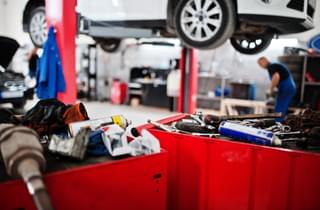Best practices for auto shop waste management
May 1, 2025
Step into any busy auto shop, and the soundtrack is familiar: the whir of impact wrenches, the hum of hoists, maybe a radio playing in the background. What you don't notice is the quiet drain of profits leaking away through half-empty bins, improperly handled fluids, or unchecked hauling fees.
Waste often feels like a chore. But refining how you manage used oil, solvents, filters, cardboard, and even everyday trash can save and make you money, simplify compliance, and improve team morale. These steps show you how. And if you'd prefer a partner to handle it all, Evirum is ready to help.

1. Get a clear picture of your waste stream
Dedicate an hour to a focused walkaround. Identify and list every type of waste your shop generates: used oil, coolant, paint sludge, oily rags, dead batteries, scrap metal, tires, cardboard, packaging, even the coffee cups from the waiting room.
Now, compare this real-world list with your recent hauling invoices. Are your container sizes right? Do pickup frequencies match your actual output? Dig into your service contracts, too. Auto-renewals, hidden fuel surcharges, and environmental fees can quietly erode profits if left unmonitored.
A professional waste assessment will fast-track this process and reveal immediate savings opportunities.
2. Stay safe and compliant
Ensure every fluid is segregated correctly. Use clearly labelled, leak-proof drums and store them securely on designated spill pallets. Reputable, licensed haulers provide electronic manifests, giving you documented proof that every litre reaches an approved disposal or recycling facility. Taking a few minutes to verify your transporter's permits and insurance is crucial, it protects your shop from hefty fines and liability.
3. Turn scrap and recyclables into revenue (or savings)
Don't underestimate the value hidden in your junk. Clean and sorted steel rotors, aluminium rims, and catalytic converters often fetch worthwhile rebates. Take full advantage of provincial stewardship programs (often funded by eco-fees you already pay) designed for tires, oil, filters, coolant, and batteries.
You'll find dedicated organizations running these programs in various provinces, such as:
- Used Oil Management Associations (UOMA) / Société de gestion des huiles usagées (SOGHU): These operate in Quebec and other provinces managing used oil, filters, antifreeze, and containers.
- Resource Productivity and Recovery Authority (RPRA): Oversees various programs in Ontario.
Consider investing in a vertical baler for cardboard and shrink wrap; it often pays for itself within a year by reducing pickup frequency and sometimes generating revenue from the bales. Switching from traditional solvent parts washers to aqueous (water-based) units drastically cuts hazardous waste generation and improves air quality in the shop.
4. Optimize your general waste service
Right-size your bins and fine-tune your pickup schedule based on actual waste volume, not guesswork. Simple housekeeping routines make a big difference here: consistently using drip pans, promptly fixing fluid leaks, and switching to reusable, professionally laundered shop rags instead of disposables. The payoff? A cleaner, safer floor and an end to unnecessary charges for half-empty pickups ("air hauling") or overflowing bins.
5. Invest in equipment that pays you back
Smart tools make waste management easier and more effective.
- Colour-coded bins placed strategically reduce sorting errors.
- Spill pallets contain leaks before they become costly messes.
- A compactor or baler frees up valuable yard space and slashes hauling costs.
- A dedicated fluid drain cart makes jobs like brake flushes faster and prevents slippery hazards.
6. Get your whole team onboard
Your technicians are juggling complex tasks and tight deadlines. Waste management procedures need to be simple, clear, and consistently reinforced. Use short toolbox talks, clear laminated charts near waste stations, and even QR codes linking to quick video reminders. Celebrate successes, like achieving a month without spills, and actively solicit feedback from your team to identify and fix any process pain points. Showing that you take their input seriously reinforces that proper waste handling is a shop priority.
The payoff: Cleaner, leaner, greener
Shops implementing these practices often see waste disposal costs drop by 10-20% or more. Compliance becomes less stressful, service bays stay cleaner and safer, and customers notice and appreciate your responsible handling of their old parts and fluids.
If you enjoy managing these details, use this guide to get started. If you'd rather focus on fixing cars while an expert partner handles the audits, scheduling, compliance and budgeting, Evirum offers practical, tailored support.
Let's talk sustainable solutions
Contact Evirum today for a personalized consultation and discover how we can help you achieve your waste management and sustainability goals.
